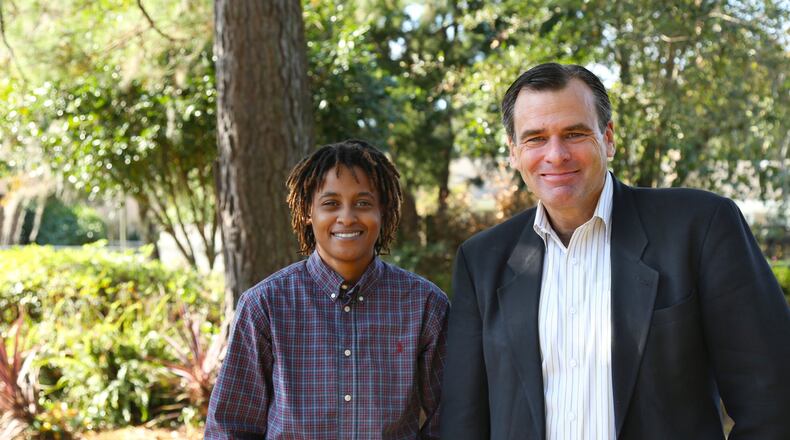The federal appeals court in Atlanta was asked Thursday to do something it’s never done before — rule that gays and lesbians cannot be discriminated against because of their sexual orientation.
The potential landmark case was brought by Jameka Evans, a former security guard at Georgia Regional Hospital in Savannah. A federal judge previously dismissed her lawsuit, in which she contends she was harassed and fired by the hospital because she’s a lesbian.
A ruling in Evans' favor by the 11th U.S. Circuit Court of Appeals would be an enormous legal victory for the LGBT community. It would expand workplace protections under the Civil Rights Act of 1964, which already prohibits discrimination on the basis of race, sex, religion and national origin.
Lambda Legal attorney Greg Nevins argued on Evans' behalf. Lambda Legal is a civil rights organization that focuses on lesbian, gay, bisexual and transgender (LGBT) communities, as well as people living with HIV/AIDS.
Nevins told the three-judge panel that discriminating against a person based on his or her sexual orientation is the same as discriminating against a person based on his or her sex.
But before Nevins could get far into his argument, Judge Bill Pryor stopped him and said he wanted to “cut to the chase.”
Regarding Evans’ sexual orientation claim, Pryor said he believed he had to follow a precedent set 37 years ago in a discrimination case brought by a man who said he was fired by Gulf Oil Co. because he was Jewish and gay. In that opinion, the appeals court said a company’s “discharge for homosexuality is not prohibited” under federal discrimination laws.
Pryor, put on the 11th Circuit by President George W. Bush, did not express opposition to finding that discrimination based on sexual orientation is the same as sex discrimination. But that 1979 ruling "binds me," said Pryor, who has been among those named on President-elect Donald Trump's short list of possible U.S. Supreme Court nominees.
Nevins responded by telling Pryor he did not think that precedent still holds, particularly in light of subsequent sex-discrimination decisions by the U.S. Supreme Court.
But Pryor suggested Evans may ultimately have to ask the entire 11th Circuit, which is allotted 12 judges, to review her case if she loses before the three-judge panel. Only then could the 11th Circuit overturn that 1979 precedent and rule in Evans’ favor.
An Obama appointee speaks
Judge Robin Rosenbaum, an appointee of President Barack Obama, sounded like she might be ready to make sexual orientation a protected class regardless of the ruling cited by Pryor. Why isn’t discrimination against a woman because she doesn’t date men the same thing as discriminating against a woman because of her gender? she asked.
Visiting Judge Jose Martinez, a President George W. Bush appointee, did not ask any questions.
Also weighing against Evans, Pryor said, is that other federal appeals courts across the country have declined to extend protections based on sexual orientation. “It seems to be a consensus with how every other circuit has addressed the rule,” he said.
But both Pryor and Rosenbaum acknowledged that all 12 judges on the federal appeals court in Chicago recently heard arguments on the issue and might be poised to extend protections to gays and lesbians, thereby creating a split among the circuits. That case involves an Indiana math teacher who said she was fired after being seen kissing her girlfriend in a car in the school parking lot.
A transgender woman’s case
In 2011, Pryor was on an 11th Circuit panel that ruled in favor of Vandy Beth Glenn, a transgender woman who was fired as a legislative editor at the General Assembly after she disclosed she was going to make the transition from man to woman. In that decision, the court found that sex discrimination includes discrimination against transgender persons because they don’t comply with stereotypical norms.
Evans, who also complained she was fired because she often dressed as most men do and doesn’t carry herself as most traditional women do, could continue to pursue such a claim, Pryor suggested. That’s because it’s based on her behavior, not her status as a lesbian, he said.
In an odd wrinkle to the case, Georgia Regional Hospital declined to send a lawyer to argue its position. When asked Thursday about Evans’ claims, Department of Behavioral Health and Developmental Disabilities spokeswoman Angelyn Dionysatos said her agency does not comment on pending litigation.
‘You shouldn’t be afraid’
Evans, who lives in Savannah, watched the arguments from a front-row seat.
“It is heartbreaking to know that no matter how good I was at my job, being a lesbian with a short haircut meant I would never be good enough,” she said. “I’m here today because I believe you shouldn’t be afraid of being fired simply because of who you are and who you love.”
Chai Feldblum, a commissioner on the Equal Employment Opportunity Commission, also attended the hearing and said she is hopeful Evans will eventually prevail. Last year, the EEOC said it believes Title VII's prohibition of sex discrimination under the Civil Rights Act applies to discrimination based on sexual orientation.
“It was a legal mistake that occurred years ago” when gays and lesbians were not made a protected class, Feldblum said. “We are now in an era of legal correction, and there’s nothing but sex that you’re taking into account when you discriminate against a gay person.”
Anthony Kreis, visiting professor at the Chicago-Kent College of Law, said the best hope for gays and lesbians to achieve anti-discrimination protections is through a court ruling like the one pursued by Evans.
"The truth of the matter is efforts in Georgia to get even basic protections for the LGBT community have failed repeatedly," he said. "The prospect of passage by the Legislature of a comprehensive civil rights bill which encompasses LGBT protections is next to zero."
The 11th Circuit court is expected to issue its decision in the coming months.
About the Author
The Latest
Featured


